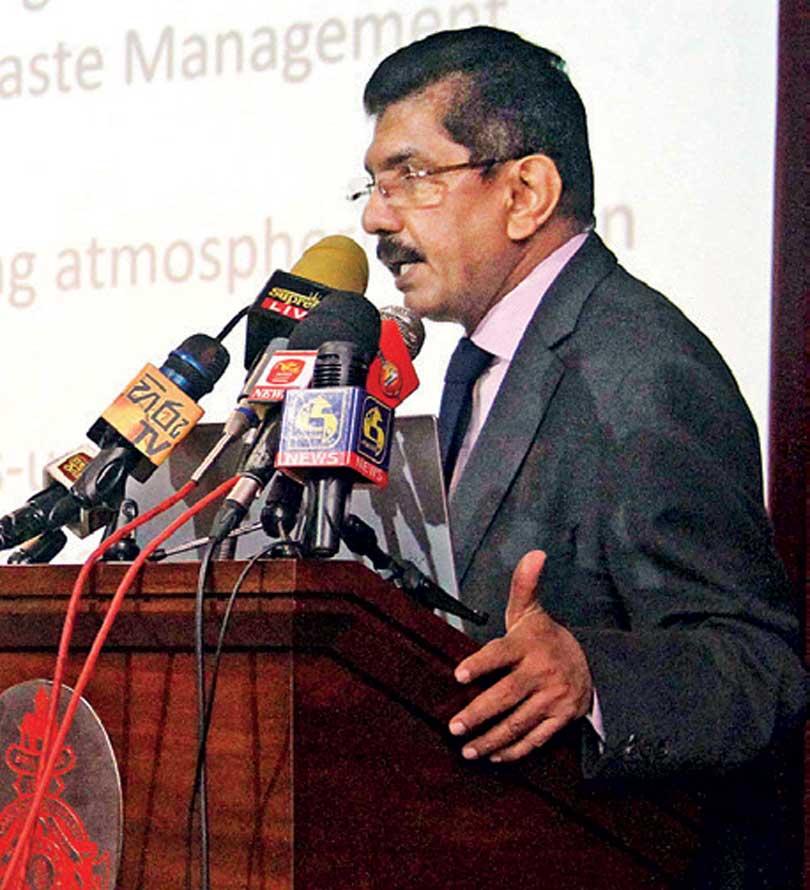03 Oct 2023 - {{hitsCtrl.values.hits}}

Dr. Anil Jasinghe, Secretary Ministry of Environment, was one of the key speakers at the conference organized by the Sri Lanka Medical Association (SLMA) on September 26 at its office in Colombo regarding climate change and titled ‘Climate change impact policies, people, health and beyond’
(Pics by Pradeep Dilruckshana)
 Climate change is a topic which captures the attention of the public quickly. This is because climatic change is visible to anyone who is sensitive to the environment. According to United Nations climate change refers to long-term shifts in temperatures and weather patterns. Such shifts can be natural, due to changes in the sun’s activity or large volcanic eruptions.
Climate change is a topic which captures the attention of the public quickly. This is because climatic change is visible to anyone who is sensitive to the environment. According to United Nations climate change refers to long-term shifts in temperatures and weather patterns. Such shifts can be natural, due to changes in the sun’s activity or large volcanic eruptions.
By taking this subject into account the Sri Lanka Medical Association organised a conference on September 26 at its office in Colombo. The conference was titled ‘Climate change impact policies, people, health and beyond’.
Secretary Ministry of Environment Dr. Anil Jasinghe presented his views regarding climate change at the conference.
“In Sri Lanka we have been experiencing a continuous rise of ambient temperature. This is very important. If you take the last several decades there was an increase in droughts and floods, high intensity rain, landslides, intense lightning and the total number of dry days. So this is the impact of climate change that we are already experiencing. For these issues Climate Action is the answer,” explained Dr. Jasinghe while giving a background explanation to the much talked about environmental issue.
Further Dr. Jasinghe offered a basic explanation to climate action. Simply climate action is the answer for climate change. Dr. Jasinghe pointed out the three pillars of climate action which are mitigation, adaptation and means of implementation.
“In any country there are high emission sectors. Then we have to work in which sectors we have to mitigate or to reduce emissions. Then you have to work on how to absorb carbon dioxide. The impact of climate change is not going to fade soon. We need to adapt ourselves into the impact of climate change. There are ways and means of adapting. For example if you take agriculture how do we practise our agriculture,’’ added Dr. Jasinghe.
To take a glance at the 2030 agenda for sustainable development, it ensures that the appropriate means of implementation (finance, trade, capacity building or science, technology and innovation) were given attention in the formulation of almost every Sustainable Development Goal.
Dr. Jasinghe underscored how developing countries like Sri Lanka are going to deal with climate change.
“Now every country in the United Nations Climate Change framework needs to submit its nationally driven contributions. We of course submitted ours in 2021. The first one we submitted in 2016 and in the year 2021 we submitted an ambitious set of nationally determined contributions. When it comes to mitigation our targets are spelled out in this document. Another major target is by 2030; 70% of electricity could be derived from renewable energy sources.” underscored Dr. Jasinghe.
Ministry of Health’s Environment and Occupational Health Unit’s Consultant and Community Physician Dr. Inoka Suraweera discussed about how climate change will impact the health sector.
“This is not only a problem related to health, but certainly affects mental health and social health. And all know that health is not only related to physical health. It has also got to do with physical, mental and social wellbeing. The important aspect we need to understand when we think about climate change projections the wet zone in Sri Lanka is going to be wetter and the dry zone is going to be dryer and there are vulnerable groups. We are trying to fight the epidemic of non-communicable diseases and most importantly outdoor workers and agricultural workers are going to be really affected by climate change. So, climate change is going to be a problem hence everyone has to be prepared. And when it comes to the health sector we have pre-actions, mitigation adaptations. But the health sector is a major sector in the adaptation area,” added Dr. Suraweera.
United Nations Populations Fund Sri Lanka’s Humanitarian Development Nexus Specialist John Buenaventura underscored how climate change affects gender.
The Gender Action Plan agreed by governments under the UN Framework Convention on Climate Change (UNFCCC) calls for women’s full, equal, and meaningful participation in the international climate process and to ensure a prominent role for women in decision-making and in climate action.
Consultant Paediatrician Dr. Surantha Perera spoke on climate change and children. He spoke about pregnant mothers and gave a reminder to the audience that they should not be forgotten. Dr. Perera also reminded that it is not only the people, but flora and fauna too will be affected by climate change.
09 Jan 2025 49 minute ago
09 Jan 2025 1 hours ago
09 Jan 2025 1 hours ago
09 Jan 2025 2 hours ago
09 Jan 2025 2 hours ago